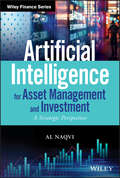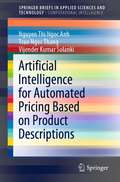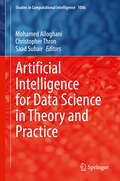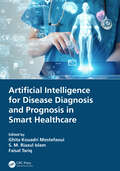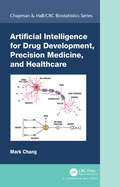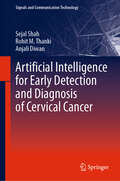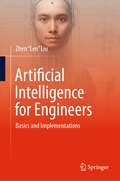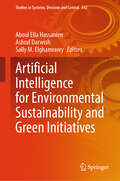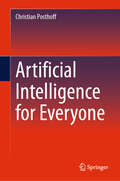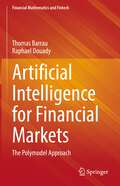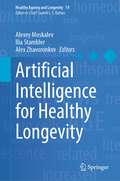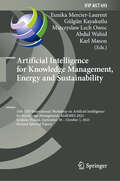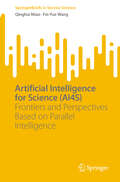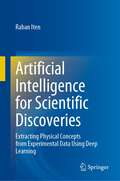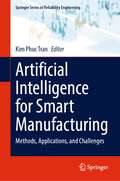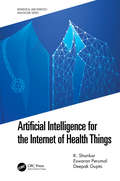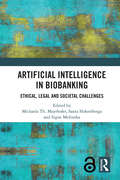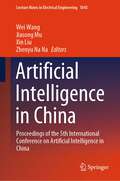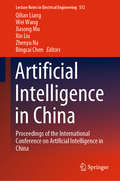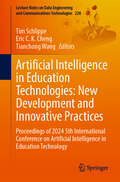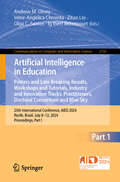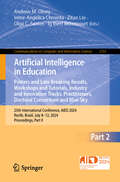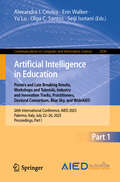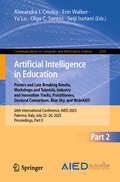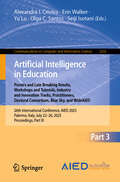- Table View
- List View
Artificial Intelligence for Asset Management and Investment: A Strategic Perspective (Wiley Finance)
by Al NaqviMake AI technology the backbone of your organization to compete in the Fintech era The rise of artificial intelligence is nothing short of a technological revolution. AI is poised to completely transform asset management and investment banking, yet its current application within the financial sector is limited and fragmented. Existing AI implementations tend to solve very narrow business issues, rather than serving as a powerful tech framework for next-generation finance. Artificial Intelligence for Asset Management and Investment provides a strategic viewpoint on how AI can be comprehensively integrated within investment finance, leading to evolved performance in compliance, management, customer service, and beyond. No other book on the market takes such a wide-ranging approach to using AI in asset management. With this guide, you’ll be able to build an asset management firm from the ground up—or revolutionize your existing firm—using artificial intelligence as the cornerstone and foundation. This is a must, because AI is quickly growing to be the single competitive factor for financial firms. With better AI comes better results. If you aren’t integrating AI in the strategic DNA of your firm, you’re at risk of being left behind. See how artificial intelligence can form the cornerstone of an integrated, strategic asset management framework Learn how to build AI into your organization to remain competitive in the world of Fintech Go beyond siloed AI implementations to reap even greater benefits Understand and overcome the governance and leadership challenges inherent in AI strategy Until now, it has been prohibitively difficult to map the high-tech world of AI onto complex and ever-changing financial markets. Artificial Intelligence for Asset Management and Investment makes this difficulty a thing of the past, providing you with a professional and accessible framework for setting up and running artificial intelligence in your financial operations.
Artificial Intelligence for Automated Pricing Based on Product Descriptions (SpringerBriefs in Applied Sciences and Technology)
by Vijender Kumar Solanki Nguyen Thi Anh Tran Ngoc ThangThis book highlights artificial intelligence algorithms used in implementation of automated pricing. It presents the process for building automated pricing models from crawl data, preprocessed data to implement models, and their applications. The book also focuses on machine learning and deep learning methods for pricing, including from regression methods to hybrid and ensemble methods. The computational experiments are presented to illustrate the pricing processes and models.
Artificial Intelligence for Data Science in Theory and Practice (Studies in Computational Intelligence #1006)
by Saad Subair Christopher Thron Mohamed AlloghaniThis book provides valuable information on effective, state-of-the-art techniques and approaches for governments, students, researchers, practitioners, entrepreneurs and teachers in the field of artificial intelligence (AI). The book explains the data and AI, types and properties of data, the relation between AI algorithms and data, what makes data AI ready, steps of data pre-processing, data quality, data storage and data platforms. Therefore, this book will be interested by AI practitioners, academics, researchers, and lecturers in computer science, artificial intelligence, machine learning and data sciences.
Artificial Intelligence for Disease Diagnosis and Prognosis in Smart Healthcare
by Faisal Tariq Ghita Kouadri Mostefaoui Islam, S. M. RiazulArtificial Intelligence (AI) in general and machine learning (ML) and deep learning (DL) in particular and related digital technologies are a couple of fledging paradigms that next-generation healthcare services are sprinting towards. These digital technologies can transform various aspects of healthcare, leveraging advances in computing and communication power. With a new spectrum of business opportunities, AI-powered healthcare services will improve the lives of patients, their families, and societies. However, the application of AI in the healthcare field requires special attention given the direct implication with human life and well-being. Rapid progress in AI leads to the possibility of exploiting healthcare data for designing practical tools for automated diagnosis of chronic diseases such as dementia and diabetes. This book highlights the current research trends in applying AI models in various disease diagnoses and prognoses to provide enhanced healthcare solutions. The primary audience of the book are postgraduate students and researchers in the broad domain of healthcare technologies. Features In-depth coverage of the role of AI in smart healthcare Research guidelines for AI and data science researchers/practitioners interested in the healthcare sector Comprehensive coverage on security and privacy issues for AI in smart healthcare
Artificial Intelligence for Drug Development, Precision Medicine, and Healthcare (Chapman & Hall/CRC Biostatistics Series)
by Mark ChangArtificial Intelligence for Drug Development, Precision Medicine, and Healthcare covers exciting developments at the intersection of computer science and statistics. While much of machine-learning is statistics-based, achievements in deep learning for image and language processing rely on computer science&’s use of big data. Aimed at those with a statistical background who want to use their strengths in pursuing AI research, the book: · Covers broad AI topics in drug development, precision medicine, and healthcare. · Elaborates on supervised, unsupervised, reinforcement, and evolutionary learning methods. · Introduces the similarity principle and related AI methods for both big and small data problems. · Offers a balance of statistical and algorithm-based approaches to AI. · Provides examples and real-world applications with hands-on R code. · Suggests the path forward for AI in medicine and artificial general intelligence. As well as covering the history of AI and the innovative ideas, methodologies and software implementation of the field, the book offers a comprehensive review of AI applications in medical sciences. In addition, readers will benefit from hands on exercises, with included R code.
Artificial Intelligence for Early Detection and Diagnosis of Cervical Cancer (Signals and Communication Technology)
by Rohit M. Thanki Sejal Shah Anjali DiwanThis book introduces the revolutionary use of AI in the field of cervical cancer detection. The book explores how advanced computer algorithms can analyze medical images and patient data to enhance early detection and accurate diagnosis of cervical cancer. The book starts by providing a comprehensive overview of cervical cancer, its risk factors, and the importance of early detection. It then delves into the fundamental concepts of artificial intelligence and its application in healthcare. Readers will gain a deeper understanding of how AI algorithms can "see" patterns in cervical cells and tissue, enabling the detection of abnormal cells and precancerous changes that may indicate the presence of cervical cancer. Drawing on the latest research and real-world case studies, the book showcases the various AI techniques used for cervical cancer screening, including the analysis of Pap smear and liquid-based cytology images. This book is an essential read for healthcare professionals, researchers, policymakers, and anyone interested in the intersection of AI and healthcare.
Artificial Intelligence for Engineers: Basics and Implementations
by Zhen "Leo" LiuThis textbook presents basic knowledge and essential toolsets needed for people who want to step into artificial intelligence (AI). The book is especially suitable for those college students, graduate students, instructors, and IT hobbyists who have an engineering mindset. That is, it serves the idea of getting the job done quickly and neatly with an adequate understanding of why and how. It is designed to allow one to obtain a big picture for both AI and essential AI topics within the shortest amount of time.
Artificial Intelligence for Environmental Sustainability and Green Initiatives (Studies in Systems, Decision and Control #542)
by Ashraf Darwish Aboul Ella Hassanien Sally M. ElghamrawyThis book discusses AI's applications in sustainability, exploring its potential in sectors such as energy, healthcare, agriculture, transportation, and waste management. Discusses applications and innovations in Green Initiatives such as energy, finance, and drug discovery. Highlights the ethical challenges and benefits of integrating AI into sustainability initiatives
Artificial Intelligence for Everyone
by Christian PosthoffThis book demystifies the topic of Artificial Intelligence for readers of varying backgrounds. The content should enable many people to discuss and follow ongoing developments in an informed way, to draw conclusions for their own life and workplace and to acquire the necessary new knowledge. The book strives to provide basic knowledge that will objectify the discussions and relieve some of the creepiness of utopian films. It must also be understood that research results are a necessary condition for progress; they are not sufficient until they can be translated into practice embedded in programs. This difficult relationship between theory and practice has been known for a long time.
Artificial Intelligence for Financial Markets: The Polymodel Approach (Financial Mathematics and Fintech)
by Thomas Barrau Raphael DouadyThis book introduces the novel artificial intelligence technique of polymodels and applies it to the prediction of stock returns. The idea of polymodels is to describe a system by its sensitivities to an environment, and to monitor it, imitating what a natural brain does spontaneously. In practice this involves running a collection of non-linear univariate models. This very powerful standalone technique has several advantages over traditional multivariate regressions. With its easy to interpret results, this method provides an ideal preliminary step towards the traditional neural network approach. The first two chapters compare the technique with other regression alternatives and introduces an estimation method which regularizes a polynomial regression using cross-validation. The rest of the book applies these ideas to financial markets. Certain equity return components are predicted using polymodels in very different ways, and a genetic algorithm is described which combines these different predictions into a single portfolio, aiming to optimize the portfolio returns net of transaction costs. Addressed to investors at all levels of experience this book will also be of interest to both seasoned and non-seasoned statisticians.
Artificial Intelligence for Healthy Longevity (Healthy Ageing and Longevity #19)
by Alexey Moskalev Ilia Stambler Alex ZhavoronkovThis book reviews the state-of-the-art efforts to apply machine learning and AI methods for healthy aging and longevity research, diagnosis, and therapy development. The book examines the methods of machine learning and their application in the analysis of big medical data, medical images, the creation of algorithms for assessing biological age, and effectiveness of geroprotective medications.The promises and challenges of using AI to help achieve healthy longevity for the population are manifold. This volume, written by world-leading experts working at the intersection of AI and aging, provides a unique synergy of these two highly prominent fields and aims to create a balanced and comprehensive overview of the application methodology that can help achieve healthy longevity for the population.The book is accessible and valuable for specialists in AI and longevity research, as well as a wide readership, including gerontologists, geriatricians, medical specialists, and students from diverse fields, basic scientists, public and private research entities, and policy makers interested in potential intervention in degenerative aging processes using advanced computational tools.
Artificial Intelligence for Knowledge Management, Energy and Sustainability: 10th IFIP International Workshop on Artificial Intelligence for Knowledge Management, AI4KMES 2023, Krakow, Poland, September 30–October 1, 2023, Revised Selected Papers (IFIP Advances in Information and Communication Technology #693)
by Eunika Mercier-Laurent Abdul Wahid Gülgün Kayakutlu Mieczyslaw Lech Owoc Karl MasonThis volume IFIP AICT 693 constitutes the refereed proceedings of the 10th IFIP International Workshop on Artificial Intelligence for Knowledge Management, AI4KMES 2023, from September 30th – October 1st, 2023, held in Krakow, Poland. The 15 full papers presented together with 2 short papers were carefully reviewed and selected from 49 submissions. The accepted papers covered a large scope of topics related to sustainability in various contexts such as smart cities, agriculture, energy and gas production and distribution, industry, management and biodiversity.
Artificial Intelligence for Science: Frontiers and Perspectives Based on Parallel Intelligence (SpringerBriefs in Service Science)
by Fei-Yue Wang Qinghai MiaoThis book presents a comprehensive framework for analyzing, evaluating, and guiding AI for Sciences (AI4Sci) research, offering a unified approach that facilitates analysis across various academic fields through a shared set of dimensions and indicators. It provides a systematic overview of recent AI4Sci advances in various disciplines and offers insights into the latest issues in and prospects of AI4Sci. The book is based on the theory of Parallel Intelligence (PI), which forms the foundation for the general AI4Sci framework. By analyzing multiple cases in various academic fields, this framework integrates key elements of AI4Sci, such as real scientific problems, datasets, virtual systems, AI methods, human roles, and organizational mechanisms, from a multidimensional perspective. It also assesses and summarizes the limitations of AI4Sci, incorporating the latest advances in AI for fundamental models. Lastly, it explores the impact of DeSci and DAO, as well as TAO, on AI4Sci ecosystem development and prospects. Through its balanced approach, the book offers readers a goal-oriented perspective, focusing on a concise presentation of the core ideas and reducing detailed descriptions of specific AI4Sci cases to a minimum.
Artificial Intelligence for Scientific Discoveries: Extracting Physical Concepts from Experimental Data Using Deep Learning
by Raban ItenWill research soon be done by artificial intelligence, thereby making human researchers superfluous? This book explains modern approaches to discovering physical concepts with machine learning and elucidates their strengths and limitations. The automation of the creation of experimental setups and physical models, as well as model testing are discussed. The focus of the book is the automation of an important step of the model creation, namely finding a minimal number of natural parameters that contain sufficient information to make predictions about the considered system. The basic idea of this approach is to employ a deep learning architecture, SciNet, to model a simplified version of a physicist's reasoning process. SciNet finds the relevant physical parameters, like the mass of a particle, from experimental data and makes predictions based on the parameters found. The author demonstrates how to extract conceptual information from such parameters, e.g., Copernicus' conclusion that the solar system is heliocentric.
Artificial Intelligence for Smart Manufacturing: Methods, Applications, and Challenges (Springer Series in Reliability Engineering)
by Kim Phuc TranThis book provides readers with a comprehensive overview of the latest developments in the field of smart manufacturing, exploring theoretical research, technological advancements, and practical applications of AI approaches. With Industry 4.0 paving the way for intelligent systems and innovative technologies to enhance productivity and quality, the transition to Industry 5.0 has introduced a new concept known as augmented intelligence (AuI), combining artificial intelligence (AI) with human intelligence (HI).As the demand for smart manufacturing continues to grow, this book serves as a valuable resource for professionals and practitioners looking to stay up-to-date with the latest advancements in Industry 5.0. Covering a range of important topics such as product design, predictive maintenance, quality control, digital twin, wearable technology, quantum, and machine learning, the book also features insightful case studies that demonstrate the practical application of these tools in real-world scenarios.Overall, this book provides a comprehensive and up-to-date account of the latest advancements in smart manufacturing, offering readers a valuable resource for navigating the challenges and opportunities presented by Industry 5.0.
Artificial Intelligence for the Internet of Health Things (Biomedical and Robotics Healthcare)
by Deepak Gupta K. Shankar Eswaran PerumalThis book discusses research in Artificial Intelligence for the Internet of Health Things. It investigates and explores the possible applications of machine learning, deep learning, soft computing, and evolutionary computing techniques in design, implementation, and optimization of challenging healthcare solutions. This book features a wide range of topics such as AI techniques, IoT, cloud, wearables, and secured data transmission. Written for a broad audience, this book will be useful for clinicians, health professionals, engineers, technology developers, IT consultants, researchers, and students interested in the AI-based healthcare applications. Provides a deeper understanding of key AI algorithms and their use and implementation within the wider healthcare sector Explores different disease diagnosis models using machine learning, deep learning, healthcare data analysis, including machine learning, and data mining and soft computing algorithms Discusses detailed IoT, wearables, and cloud-based disease diagnosis model for intelligent systems and healthcare Reviews different applications and challenges across the design, implementation, and management of intelligent systems and healthcare data networks Introduces a new applications and case studies across all areas of AI in healthcare data K. Shankar (Member, IEEE) is a Postdoctoral Fellow of the Department of Computer Applications, Alagappa University, Karaikudi, India. Eswaran Perumal is an Assistant Professor of the Department of Computer Applications, Alagappa University, Karaikudi, India. Dr. Deepak Gupta is an Assistant Professor of the Department Computer Science & Engineering, Maharaja Agrasen Institute of Technology (GGSIPU), Delhi, India.
Artificial Intelligence in Biobanking: Ethical, Legal and Societal Challenges
by Santa Slokenberga Michaela Th. Mayrhofer Signe MežinskaThis insightful collection highlights the ethical, legal and societal issues associated with the increasing role played by artificial intelligence (AI) in medical biobanks, a key research resource in the global study of disease prevention and improving individual care.Although AI has the potential to speed up health research, the book considers numerous questions that the technology poses, from the building of trust to the prevention of harm to individuals, vulnerable groups or entire populations. Examining the tension between scientific progress and safeguarding of individual rights, and covering key issues such as accountability, data bias, transparency, and liability, the book considers the legal landscape in which biobanks operate, and what layers of governance are required to oversee such an important resource in a fluid technological age.A timely volume that brings together scholars and experts from social sciences, ethics, and law, this important book will interest researchers and professionals in Biomedicine, Law, and the broader Health Sciences.The Open Access version of this book, available at http://www.taylorfrancis.com, has been made available under a Creative Commons Attribution CC BY 4.0 license.
Artificial Intelligence in China: Proceedings of the 5th International Conference on Artificial Intelligence in China (Lecture Notes in Electrical Engineering #1043)
by Wei Wang Jiasong Mu Xin Liu Zhenyu Na NaThis book brings together papers presented at the 2023 The International Conference on Artificial Intelligence in China (ChinaAI), which provides a venue to disseminate the latest developments and to discuss the interactions and links between these multidisciplinary fields. Spanning topics covering all topics in Artificial Intelligence with new development in China, this book is aimed at undergraduate and graduate students in Electrical Engineering, Computer Science and Mathematics, researchers and engineers from academia and industry as well as government employees (such as NSF, DOD, DOE).
Artificial Intelligence in China: Proceedings of the International Conference on Artificial Intelligence in China (Lecture Notes in Electrical Engineering #572)
by Qilian Liang Wei Wang Jiasong Mu Xin Liu Zhenyu Na Bingcai ChenThis book brings together papers presented at the International Conference on Artificial Intelligence in China (ChinaAI) 2019, which provided a venue for disseminating the latest advances and discussing the interactions and links between the various subfields of AI. Addressing topics that cover virtually all aspects of AI and the latest developments in China, the book is chiefly intended for undergraduate and graduate students in Electrical Engineering, Computer Science, and Mathematics, for researchers and engineers from academia and industry, and for government employees (e.g. at the NSF, DOD, and DOE).
Artificial Intelligence in Education Technologies: Proceedings of 2024 5th International Conference on Artificial Intelligence in Education Technology (Lecture Notes on Data Engineering and Communications Technologies #228)
by Eric C. K. Cheng Tianchong Wang Tim SchlippeThis book is a collection of selected research papers presented at the 2024 5th International Conference on Artificial Intelligence in Education Technology (AIET 2024), held in Barcelona, Spain, on July 29 - 31, 2024. AIET establishes a platform for AI in education researchers to present research, exchange innovative ideas, propose new models, as well as demonstrate advanced methodologies and novel systems. It is a timely and up-to-date publication responsive to the rapid development of AI technologies, practices and their increasingly complex interplay with the education domain. It promotes the cross-fertilisation of knowledge and ideas from researchers in various fields to construct the interdisciplinary research area of AI in Education. These subject areas include computer science, cognitive science, education, learning sciences, educational technology, psychology, philosophy, sociology, anthropology and linguistics. The feature of this book will contribute from diverse perspectives to form a dynamic picture of AI in Education. It also includes various domain-specific areas for which AI and other education technology systems have been designed or used in an attempt to address challenges and transform educational practice. Education stands as a cornerstone for societal progress, and ensuring universal access to quality education is integral to achieving Goal 4 of the United Nations' Sustainable Development Goals (SDGs). The goal is to ensure inclusive and equitable quality education for all by 2030. This involves not only expanding access to education but also improving the quality of education to promote lifelong learning opportunities. AI has the potential to significantly contribute to the achievement of Goal 4. It is committed to exploring how AI may play a role in bringing more innovative practices, transforming education, and triggering an exponential leap towards the achievement of the Education 2030 Agenda. Providing broad coverage of recent technology-driven advances and addressing a number of learning-centric themes, the book is an informative and useful resource for researchers, practitioners, education leaders and policy-makers who are involved or interested in AI and education.
Artificial Intelligence in Education. Posters and Late Breaking Results, Workshops and Tutorials, Industry and Innovation Tracks, Practitioners, Doctoral Consortium and Blue Sky: 25th International Conference, AIED 2024, Recife, Brazil, July 8–12, 2024, Proceedings, Part I (Communications in Computer and Information Science #2150)
by Olga C. Santos Ig Ibert Bittencourt Irene-Angelica Chounta Andrew M. Olney Zitao LiuThis volume constitutes poster papers and late breaking results presented during the 25th International Conference on Artificial Intelligence in Education, AIED 2024, which took place in Recife, Brazil, during July 8–12, 2024. The 18 full papers and 92 short papers were carefully reviewed and selected from 200 submissions. They are organized in topical sections as follows: Part One: Blue Sky, Industry, Innovation and Practitioner, WideAIED and Late-Breaking Results. Part Two: Late-Breaking Results, Doctoral Consortium, Workshops and Tutorials.
Artificial Intelligence in Education. Posters and Late Breaking Results, Workshops and Tutorials, Industry and Innovation Tracks, Practitioners, Doctoral Consortium and Blue Sky: 25th International Conference, AIED 2024, Recife, Brazil, July 8–12, 2024, Proceedings, Part II (Communications in Computer and Information Science #2151)
by Olga C. Santos Ig Ibert Bittencourt Irene-Angelica Chounta Andrew M. Olney Zitao LiuThis volume constitutes poster papers and late breaking results presented during the 25th International Conference on Artificial Intelligence in Education, AIED 2024, which took place in Recife, Brazil, during July 8–12, 2024. The 18 full papers and 92 short papers were carefully reviewed and selected from 200 submissions. They are organized in topical sections as follows: Part One: Blue Sky, Industry, Innovation and Practitioner, WideAIED and Late-Breaking Results. Part Two: Late-Breaking Results, Doctoral Consortium, Workshops and Tutorials.
Artificial Intelligence in Education. Posters and Late Breaking Results, Workshops and Tutorials, Industry and Innovation Tracks, Practitioners, Doctoral Consortium, Blue Sky, and WideAIED: 26th International Conference, AIED 2025, Palermo, Italy, July 22–26, 2025, Proceedings, Part I (Communications in Computer and Information Science #2590)
by Olga C. Santos Alexandra I. Cristea Seiji Isotani Yu Lu Erin WalkerThis three-volume set CCIS 2590-2592 constitutes poster papers and late breaking results, workshops and tutorials, practitioners, industry and policy track, doctoral consortium, blue sky and wideAIED papers presented at the 26th International Conference on Artificial Intelligence in Education, AIED 2025, held in Palermo, Italy, during July 22–26, 2025. The 72 full papers and 73 short papers (72 of them presented as posters) presented in this book were carefully reviewed and selected from 296 submissions. They are organized in topical sections as follows: Part I: BlueSky; Practitioners, Industry and Policy; WideAIED; Doctoral Consortium. Part II: Late Breaking Results; Part III: Late Breaking Results; Workshops and Tutorials.
Artificial Intelligence in Education. Posters and Late Breaking Results, Workshops and Tutorials, Industry and Innovation Tracks, Practitioners, Doctoral Consortium, Blue Sky, and WideAIED: 26th International Conference, AIED 2025, Palermo, Italy, July 22–26, 2025, Proceedings, Part II (Communications in Computer and Information Science #2591)
by Olga C. Santos Alexandra I. Cristea Seiji Isotani Yu Lu Erin WalkerThis three-volume set CCIS 2590-2592 constitutes poster papers and late breaking results, workshops and tutorials, practitioners, industry and policy track, doctoral consortium, blue sky and wideAIED papers presented at the 26th International Conference on Artificial Intelligence in Education, AIED 2025, held in Palermo, Italy, during July 22–26, 2025. The 72 full papers and 73 short papers (72 of them presented as posters) presented in this book were carefully reviewed and selected from 296 submissions. They are organized in topical sections as follows: Part I: BlueSky; Practitioners, Industry and Policy; WideAIED; Doctoral Consortium. Part II: Late Breaking Results; Part III: Late Breaking Results; Workshops and Tutorials.
Artificial Intelligence in Education. Posters and Late Breaking Results, Workshops and Tutorials, Industry and Innovation Tracks, Practitioners, Doctoral Consortium, Blue Sky, and WideAIED: 26th International Conference, AIED 2025, Palermo, Italy, July 22–26, 2025, Proceedings, Part III (Communications in Computer and Information Science #2592)
by Olga C. Santos Alexandra I. Cristea Seiji Isotani Yu Lu Erin WalkerThis three-volume set CCIS 2590-2592 constitutes poster papers and late breaking results, workshops and tutorials, practitioners, industry and policy track, doctoral consortium, blue sky and wideAIED papers presented at the 26th International Conference on Artificial Intelligence in Education, AIED 2025, held in Palermo, Italy, during July 22–26, 2025. The 72 full papers and 73 short papers (72 of them presented as posters) presented in this book were carefully reviewed and selected from 296 submissions. They are organized in topical sections as follows: Part I: BlueSky; Practitioners, Industry and Policy; WideAIED; Doctoral Consortium. Part II: Late Breaking Results; Part III: Late Breaking Results; Workshops and Tutorials.
